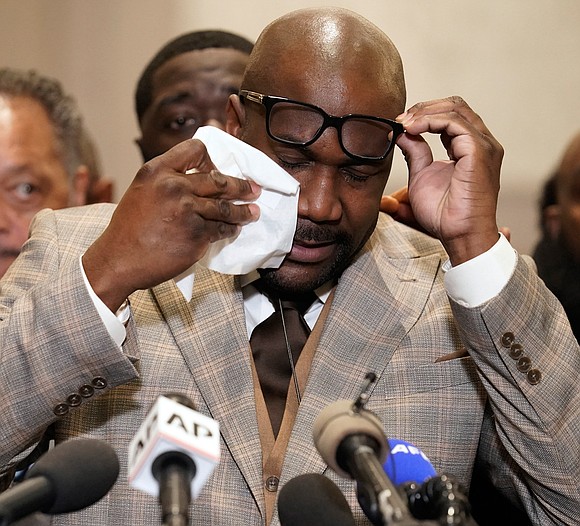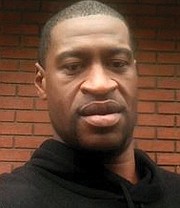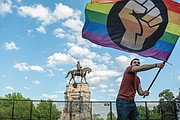Guilty
Former Minneapolis police officer faces decades in prison after a jury convicts him of three counts in the heinous kill of George Floyd; tears of joy and relief flood the nation
Free Press wire report | 4/22/2021, 6 p.m.

MINNEAPOLIS
Black Americans and others from Missouri to Florida to Minnesota cheered, marched, hugged, waved signs and sang jubilantly in the streets Tuesday after a Minneapolis jury found former police officer Derek Chauvin guilty of murder in the death of George Floyd.
After three weeks of testimony, the trial of Mr. Chauvin ended swiftly: Barely over a day of jury deliberations, then just minutes for the verdicts to be read — guilty, guilty and guilty — and Mr. Chauvin was handcuffed and taken away to prison.
“Today, we are able to breathe again,” Mr. Floyd’s younger brother, Philonise Floyd, said at a joyous family news conference where tears streamed down his face as he likened Mr. Floyd’s death to that of 1955 Mississippi lynching victim Emmett Till, except that this time there were cameras around to show the world what happened.
Mr. Chauvin, 45, could be sent to prison for decades when he is sentenced in about two months in a case that triggered worldwide protests, violence and a furious re-examination of racism and policing in the United States.
The verdict set off jubilation mixed with sorrow across the city and around the nation. Hundreds of people poured into the streets of Minneapolis, some running through traffic with banners. Drivers blared their horns in celebration.
In Richmond, drivers honked their horns in jubilation around the Monument Avenue statue of Confederate Robert E. Lee, where a man shouting, “Justice!” waved a multicolor banner at passing motorists in support of the verdict.
The jury of six white and six Black or multiracial people came back with its verdict Tuesday afternoon after about 10 hours of deliberations over two days. The now-fired white officer was found guilty of second degree unintentional murder, third degree murder and second degree manslaughter in the May 25 death of Mr. Floyd, who was put face down in the street with his hands cuffed behind his back and was pinned to the pavement with Mr. Chauvin’s knee on his neck for more than 9 minutes.
As the verdict was read, Mr. Chauvin’s face was obscured by a COVID-19 mask. Little reaction could be seen beyond his eyes darting around the courtroom. His bail was immediately revoked. Sentencing will be in two months; the most serious charge carries up to 40 years in prison.
Defense attorney Eric Nelson followed Mr. Chauvin out of the courtroom without comment.
President Joe Biden welcomed the verdict, saying Mr. Floyd’s death was “a murder in full light of day, and it ripped the blinders off for the whole world” to see systemic racism.
But he warned: “It’s not enough. We can’t stop here. We’re going to deliver real change and reform. We can and we must do more to reduce the likelihood that tragedies like this will ever happen again.”
The joy and relief stood in stark contrast to the anger and sometimes violent protests that engulfed the country following Mr. Floyd’s horrific death that was captured on cellphone video by bystander Darnella Frazier, who was 17 at the time. The video immediately went viral on the internet.
Ms. Frazier’s tearful testimony about the incident she witnessed along with her 9-year-old cousin told of the trauma she still feels. She testified that Mr. Chauvin gave the bystanders a “cold” and “heartless” stare. She and others said they felt a sense of helplessness and lingering guilt from witnessing Mr. Floyd’s slow-motion death.
“It’s been nights I stayed up, apologizing and apologizing to George Floyd for not doing more, and not physically interacting and not saving his life,” she testified.
In an emoji-filled post on social media Tuesday, Ms. Frazier wrote that she “cried so hard” when she heard the verdict.
“…GUILTY ON ALL 3 CHARGES!!! THANK YOU GOD THANK YOU THANK YOU THANK YOU THANK YOU George Floyd we did it!! Justice has been served.”
But Tuesday’s celebrations were tempered with the heavy knowledge that Mr. Chauvin’s conviction was just a first step on the long road to address racial injustices by police.
Many said they had prepared for a different result after watching countless deaths of people of color at the hands of police who went unpunished. The shooting death of another Black man, Daunte Wright, by officers in suburban Minneapolis during the trial and of 13-year-old Adam Toledo in Chicago last month heightened tensions and muted the court victory for many.
In Columbus, Ohio, some residents had their celebration over the verdict cut short by reports Tuesday that police fatally shot a 16-year-old Black girl, Ma’Khia Bryant.
“As you’re getting one phone call that he was guilty, I’m getting the next phone call that this is happening in my neighborhood,” Kimberly Shepherd said.
Several hours later, police released body-camera footage that appeared to show the officer firing just as the girl lunged at another female with a knife.
The Rev. Jesse Jackson traveled to Minneapolis for the verdict, and said there was relief but no celebrating “because the killing continues.”
“Finally we did get some justice,” Gwen Carr, the mother of Eric Garner, a Black man who died at the hands of police in New York City in 2014, said after pronouncing herself “elated” at the verdict. No criminal charges were brought in her son’s death; his last words were “I can’t breathe,” which became a rallying cry among activists.
In Los Angeles, several dozen people gathered to celebrate at the corner of Florence and Normandie avenues, which was the scene of chaos and violence in 1992 when the city dissolved into riots after four officers were acquitted in the beating of motorist Rodney King. A Black man in a Lakers cap danced and chanted: “Get used to this, get used to justice!” Passing cars blared their horns as demonstrators waved signs and Black Lives Matter flags.
In Houston’s Third Ward, the historically Black neighborhood where Mr. Floyd grew up, a small crowd gathered under a tent near a mural of Mr. Floyd to listen as the verdict was read on TV. People driving by honked their car horns and yelled, “Justice!”
“We feeling good. We thank everybody that stood with us. It’s a blessed moment,” said Jacob David, 39, who knew Mr. Floyd and wiped away tears.
At the intersection where Mr. Floyd was pinned down, a crowd chanted, “One down, three to go!” — a reference to the three other fired Minneapolis officers facing trial in August on charges of aiding and abetting murder in Mr. Floyd’s death.
It is unusual for police officers to be prosecuted for killing someone on the job. And convictions are extraordinarily rare.
Out of the thousands of deadly police shootings in the United States since 2005, fewer than 140 officers have been charged with murder or manslaughter, according to data maintained by Phil Stinson, a criminologist at Bowling Green State University. Before Tuesday, only seven were convicted of murder.








